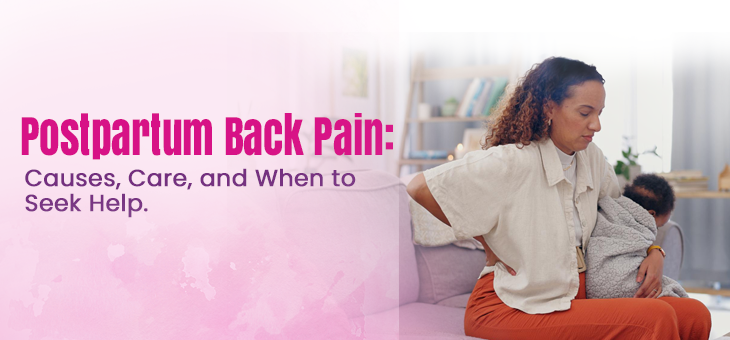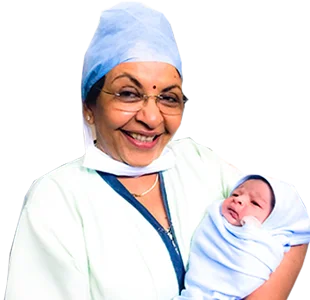Postpartum Back Pain: Causes, Care, and When to Seek Help
Introduction
One of the happiest moments of life is welcoming a new baby. Postpartum back pain is one of the most common sudden health issues that many new mothers face throughout this wonderful journey. Although it's simple to dismiss it as "normal," being aware of the causes, available treatments, and when to get medical attention can help your recovery go more smoothly and comfortably.
As a reputable pregnancy hospital in Bangalore, Cambridge Hospital helps women at every step of the postpartum healing process, not just during birth.
Understanding Postpartum Back Pain
It's no secret that pregnancy and childbirth put a lot of strain on your body. It's common to experience some aches and pains after delivery, particularly in the back. Depending on a number of variables, including your posture, degree of physical activity, and hormones, back discomfort may persist for weeks or even months following labor.
It's critical to pay attention to the signs. Getting the right assistance as soon as possible can make all the difference if your back pain affects your ability to move, sleep, or care for your child.
Common Causes of Postpartum Back Pain
1. Hormonal Changes — Especially Relaxin
Your body creates the hormone relaxin when you are pregnant. In order to get your body ready for childbirth, this hormone helps relax ligaments and joints. Relaxin, however, remains in the body for a while after birth, so your joints may still be shaky and more likely to strain, particularly in the lower back.
2. Poor Posture While Breastfeeding
When nursing or bottle-feeding their infant, many moms have a tendency to stoop down. This continual forward leaning strains your upper and lower back over time. Your neck and back muscles may strain if you don't have a pillow or arm support.
3. Lifting Your Baby Incorrectly
You’ll be picking up your baby dozens of times a day. If you’re bending from your waist instead of squatting with your knees, you're putting extra pressure on your spine, leading to mid or lower back pain.
4. Weakened Core Muscles
Your abdominal muscles are weaker after giving birth, particularly if you underwent a cesarean section. It is easier to feel exhausted, sore, and achy when your core is weak since your back must work more to hold your posture.
When Is Back Pain Normal vs. a Cause for Concern?
Back pain that is mild to moderate during the first 6–8 weeks following delivery is usually considered as normal. Your muscles and body are still adapting and repairing. But it's critical to recognize when back discomfort can indicate a more serious issue.
Typical Recovery Timeline
- Lower back and pelvic pain over the first few weeks
- 6–12 weeks: The soreness should progressively go away
- After three months, the majority of mothers report feeling much better.
Red Flags That Need Attention
- Pain that does not go away but rather gets worse
- Numbness or tingling in the legs
- Severe pain that interferes with sitting and walking
- Fever or infection symptoms close to the spine
- Pain that makes it difficult to sleep or take care of the baby
It's advisable to speak with a postpartum care specialist or the best gynecologist in Bangalore right away if you have any of these symptoms.
Home Remedies and Self-Care Tips
There are a few things you can do at home to lessen discomfort before you head straight to the doctor:
Gentle Exercises and Stretches
Begin with easy postpartum healing yoga, child's pose, and mild pelvic tilts. These stretches support the gradual rebuilding of your core and strengthening of your back.
Posture Awareness
Keep your spine straight while feeding, rocking, or changing the baby's diaper. Avoid hunching forward, sit on a firm chair, and use a feeding pillow. When lifting, always keep your baby close to your chest.
Use Hot or Cold Compresses
Use a heating pad or warm compress on the aching spot to ease tense muscles. Inflammation can be lessened with the use of a cold pack.
Professional Treatment Options
Professional treatments can be helpful if back pain worsens or continues after home care.
Physiotherapy
Postpartum physiotherapists can help you with specific exercises to help you feel better, strengthen your muscles, and reduce pain. Several pregnancy hospitals in Bangalore, like Cambridge Hospital, provide new mothers with in-person physical rehabilitation.
Chiropractic Care
Gentle chiropractic adjustments can help some women, particularly those whose spines are crooked due to poor posture or labor.
Safe Pain Relief
Consult your physician before taking any painkillers, particularly if you are nursing a baby. Personalized counsel is crucial, although many prescription drugs are safe when taken as directed.
How a Pregnancy Hospital in Bangalore Can Help
Selecting the appropriate postpartum support network might significantly impact your recovery process.
Our services at Cambridge Hospital include:
- Programs for postpartum physical therapy customized to meet your needs for recovery
- Consultations with the best gynecologist in Bangalore who specialize in postnatal care
- Professional guidance on home workouts, baby raising skills, and nursing position
- Assistance for mothers recovering from traumatic deliveries, persistent pain, or C-sections
We are aware that postpartum care involves more than simply physical recovery; it also requires offering moms with emotional, mental, and physical support. Our team of experts are always available to help you at every stage.
Conclusion
You don't have to endure back pain after giving birth, even though it's more common than you might imagine. You can get well and feel like yourself again with a little attention, the right advice, and prompt professional assistance.
Don’t hesitate to reach out. Cambridge Hospital can provide you with physiotherapy, professional advice, or a gynecological consultation.
Take the first step toward a pain-free recovery by scheduling a visit with one of our postpartum care specialists right now.


